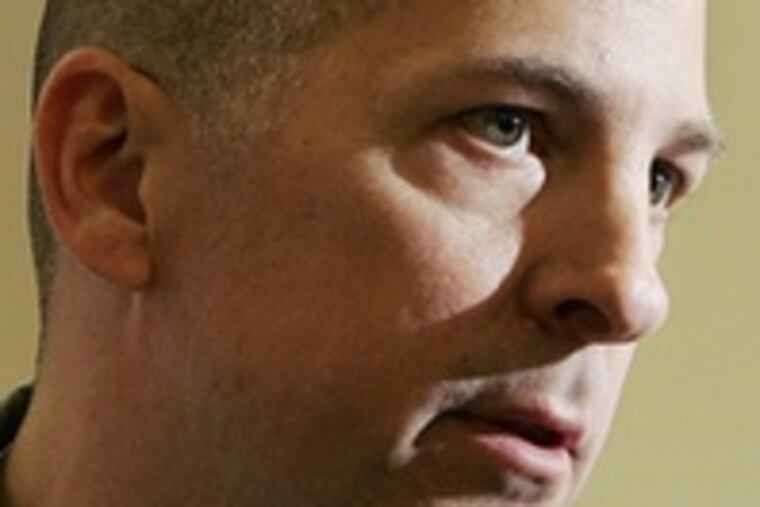At Ft. Dix, readying to ship out
Summer deployment to Iraq is not so far away for the N.J. National Guard.

FORT DIX - For the officer leading New Jersey's largest National Guard deployment to a war zone since World War II, the goal is simple: Get the job done in Iraq and get everyone home safely.
"Our goal, obviously, is to take every soldier over and to bring every soldier back with us," said Col. Steven Ferrari.
Ferrari, who joined the military in 1981, is the commander of the 50th Infantry Brigade Combat Team, based in Lawrenceville, which is slated to go to Iraq late next summer.
Ferrari spoke last week about the forthcoming deployment, preparing his troops, their mission in Iraq, and what the father of two sons, including one who just joined the National Guard, is thinking about his own first trip to the war zone.
Originally, the New Jersey troops weren't slated to go to Iraq until 2010, but that timetable was moved up earlier this fall as part of Pentagon efforts to limit how long troops are away from home.
About 2,600 New Jersey troops will be joined by about 500 soldiers from other states, Ferrari said.
Soldiers who served with the two units that returned from Iraq in June after being away from their families for almost two years will not be required to return to Iraq, although some have volunteered for the mission, the colonel said.
But other troops who have served on earlier missions, including to Iraq, will be required to deploy, he said.
Some critics, including Gov. Corzine, have criticized the use of National Guard soldiers for extended missions, but Ferrari said the role of National Guard troops in the Iraq conflict isn't lessening.
"Our job, when we all sign up, is to support the needs of the president and the Department of Defense and the governor, in the cases of homeland security. It might not be fair, but it's all part of what we signed up to do, and I think that the average soldier understands that," Ferrari said.
There's a small chance that Ferrari's 19-year-old son, Steven, will be in Iraq at the same time as his father. Ferrari swore in his son to the New Jersey National Guard a few weeks ago.
His son's military police unit is slated to go to Iraq, but it's unlikely the younger Ferrari will finish basic training and join the unit before it leaves, his father said.
The colonel said his pride for his son is also mixed with a father's concern.
"I know that there's a danger, but on the other hand, he's an adult now," he said.
When the unit arrives in Iraq, the bulk of its mission will be providing security to military installations where detainees are kept.
The mission is similar to one performed by a U.S. Army Reserve unit that included seven members accused of abuse at the Abu Ghraib prison while taking care of detainees under their care.
Ferrari said he studied the Abu Ghraib issue and how to prevent similar occurrences while at the Army War College earlier this year.
"One of the biggest issues was just a breakdown of leadership at Abu Ghraib," Ferrari said. "I think the military has taken corrective actions and precautions to make sure that nothing like that ever happens again."
He said the soldiers would most likely be training at Fort Bliss, in Texas, which specializes in instructing troops how to deal with detainees.
"It's very realistic. It's good training," Ferrari said.
Currently, soldiers are going through an evaluation process to see who is physically able to go. In February, they'll start stepped-up training, meaning more weekends and a longer training period.
In June, the troops would be mobilized, which would begin a full-time training period of no more than 90 days, before heading off to Kuwait late in the summer and then to Iraq.
Ferrari said while the military wanted to minimize the time that troops were away from their families, there were a number of factors that made it unlikely - although nothing's definite yet - that the troops would spend that 90-day stretch at nearby Fort Dix.
Unlike the Texas military installation, Fort Dix doesn't have specialized detainee training and isn't designed to train such a large group at one time. Also, Ferrari said, sometimes having the troops farther away from home means they'll be more focused.
To prepare, Ferrari said, he has been e-mailing with colleagues in Iraq, monitoring Internet sites where military personnel share experiences, and speaking with officers he knows to get advice on the forthcoming mission.
The colonel said that there's always a risk when troops go to Iraq but that their mission would be one of the less dangerous ones and pointed to the recent security improvements in Iraq.
"I guess everyone's probably a little nervous," he said, adding: "I look forward to it. I look forward to the challenge."